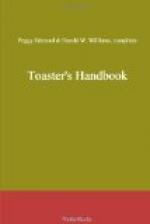“I’d like to get off here,” he drawled, “if you fellows don’t mind taking your hands out of my pocket.”
SUCCESS
Nothing succeeds like excess.—Life.
Nothing succeeds like looking successful.—Henriette Corkland.
Success in life often consists in knowing just when to disagree with one’s employer.
A New Orleans lawyer was asked to address the boys of a business school. He commenced:
“My young friends, as I approached the entrance to this room I noticed on the panel of the door a word eminently appropriate to an institution of this kind. It expresses the one thing most useful to the average man when he steps into the arena of life. It was—”
“Pull,” shouted the boys, in a roar of laughter, and the lawyer felt that he had taken his text from the wrong side of the door.
I’d rather be a Could Be
If I could not be an Are;
For a Could Be is a May Be,
With a chance of touching
par.
I’d rather be a Has Been
Than a Might Have Been, by
far;
For a Might Have Been has never been,
But a Has was once an Are.
’Tis not in mortals to command success,
But we’ll do more, Sempronius,—
We’ll deserve it.
—Addison.
There are two ways of rising in the world: either by one’s own industry or profiting by the foolishness of others.—La Bruyere.
Success is counted sweetest
By those who ne’er succeed.
—Emily Dickinson.
See also Making good.
SUFFRAGETTES
When a married woman goes out to look after her rights, her husband is usually left at home to look after his wrongs.—Child Harold.
“’Ullo, Bill, ’ow’s things with yer?”
“Lookin’ up, Tom, lookin’ up.”
“Igh cost o’ livin’ not ‘ittin’ yer, Bill?”
“Not so ’ard, Tom—not so ’ard. The missus ’as went ’orf on a hunger stroike and me butcher’s bills is cut in arf!”
I’d hate t’ be married t’ a suffragette an’ have t’ eat Battle Creek breakfasts.—Abe Martin.
FIRST ENGLISHMAN—“Why do you allow your wife to be a militant suffragette?”
SECOND ENGLISHMAN—“When she’s busy wrecking things outside we have comparative peace at home.”—Life.
Recipe for a suffragette:
To the power that already lies in her
hands
You add equal rights with
the gents;
You’ll find votes that used to bring
two or three plunks,
Marked down to ninety-eight
cents.
When Mrs. Pankhurst, the English suffragette, was in America she met and became very much attached to Mrs. Lee Preston, a New York woman of singular cleverness of mind and personal attraction. After the acquaintance had ripened somewhat Mrs. Pankhurst ventured to say:




